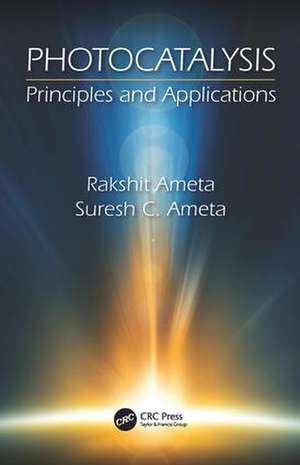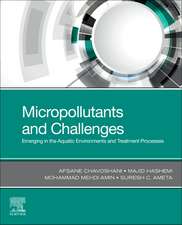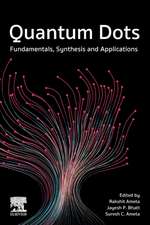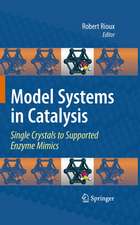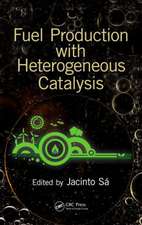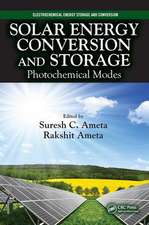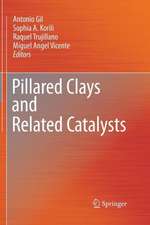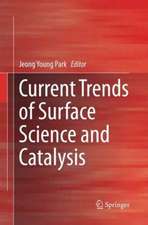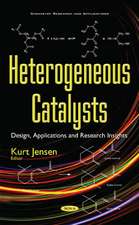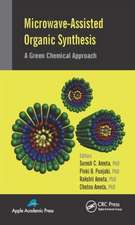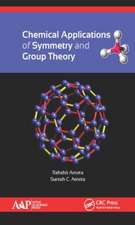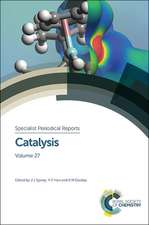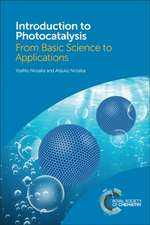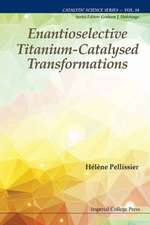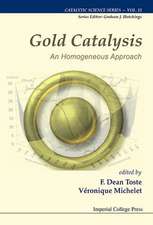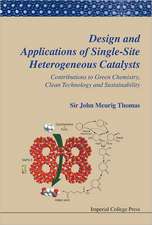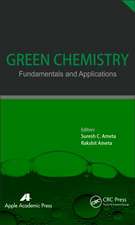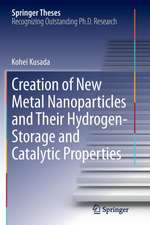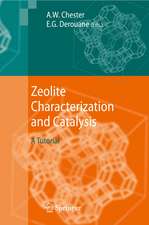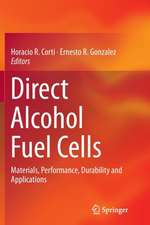Photocatalysis: Principles and Applications
Autor Rakshit Ameta, Suresh C. Ametaen Limba Engleză Hardback – dec 2016
- Introduces the basic principle of photocatalysis.
- Provides an overview of the types of semiconductors, their immobilization, and modifications to make them more active.
- Gives possible applications of photocatalysis in wastewater treatment and strategy to combat against different kinds of pollutions like water, air, and soil.
- Summarizes efforts in the field of photosplitting of water as a newer energy source and photoreduction of carbon dioxide for providing synthetic fuels and as a step towards mimicking photosynthesis.
- Discusses inactivation of different kinds of microorganisms.
- Covers medical applications.
- Introduces the basic principle of photocatalysis.
- Provides an overview of the types of semiconductors, their immobilization, and modifications to make them more active.
- Gives possible applications of photocatalysis in wastewater treatment and strategy to combat against different kinds of pollutions like water, air, and soil.
- Summarizes efforts in the field of photosplitting of water as a newer energy source and photoreduction of carbon dioxide for providing synthetic fuels and as a step towards mimicking photosynthesis.
- Discusses inactivation of different kinds of microorganisms.
- Covers medical applications.
| Toate formatele și edițiile | Preț | Express |
|---|---|---|
| Paperback (1) | 521.77 lei 6-8 săpt. | |
| CRC Press – 10 dec 2019 | 521.77 lei 6-8 săpt. | |
| Hardback (1) | 1030.01 lei 3-5 săpt. | +32.13 lei 7-13 zile |
| CRC Press – dec 2016 | 1030.01 lei 3-5 săpt. | +32.13 lei 7-13 zile |
Preț: 1030.01 lei
Nou
Puncte Express: 1545
Preț estimativ în valută:
197.13€ • 207.96$ • 164.28£
197.13€ • 207.96$ • 164.28£
Carte disponibilă
Livrare economică 12-26 decembrie
Livrare express 28 noiembrie-04 decembrie pentru 42.12 lei
Preluare comenzi: 021 569.72.76
Specificații
ISBN-13: 9781482254938
ISBN-10: 148225493X
Pagini: 340
Ilustrații: 7 Tables, black and white; 43 Illustrations, black and white
Dimensiuni: 156 x 234 x 19 mm
Greutate: 0.61 kg
Ediția:1
Editura: CRC Press
Colecția CRC Press
ISBN-10: 148225493X
Pagini: 340
Ilustrații: 7 Tables, black and white; 43 Illustrations, black and white
Dimensiuni: 156 x 234 x 19 mm
Greutate: 0.61 kg
Ediția:1
Editura: CRC Press
Colecția CRC Press
Cuprins
Contents
1. Introduction
2. Photocatalysis
3. Binary semiconductors
4. Ternary semiconductors
5. Quaternary semiconductors
6. Metallization
7. Doping
8. Sensitization
9. Composites
10. Immobilization
11. Hydrogen generation
12. Solar Cells
13. Waste water treatment
14. Reduction of carbon dioxide
15. Artificial photosynthesis
16. Medical applications
17. Other applications
18. Inactivation of microorganisms
19. Photoreactors
20. Future trends
1. Introduction
2. Photocatalysis
3. Binary semiconductors
4. Ternary semiconductors
5. Quaternary semiconductors
6. Metallization
7. Doping
8. Sensitization
9. Composites
10. Immobilization
11. Hydrogen generation
12. Solar Cells
13. Waste water treatment
14. Reduction of carbon dioxide
15. Artificial photosynthesis
16. Medical applications
17. Other applications
18. Inactivation of microorganisms
19. Photoreactors
20. Future trends
Notă biografică
Rakshit Ameta obtained his Master of Science degree with first position and was awarded Gold Medal. He received the Fateh Singh Award from the Maharana Mewar Foundation for his meritorious performance. He has worked at M. L. Sukhadia University, University of Kota and presently is an Associate Professor of Chemistry at PAHER University. Widely published, Dr. Ameta has been elected as Scientist-in-Charge, Industrial and Applied Chemistry Section, Indian Chemical Society (2014–2016), and was also elected as a Council Member of the Indian Chemical Society (2011–2013) and the Indian Council of Chemists (2012–2015).
Suresh C. Ameta obtained his Master’s degree and was awarded Gold Medal in 1970. He secured a first position in M. Phil. in 1978, and Ph.D. in 1980 from Vikram University. He served as Professor and Head, Department of Chemistry, North Gujarat University Patan (1994) and M. L. Sukhadia University (2002–2005), and as Head, Department of Polymer Science (2005–2008). He also served as Dean, Post Graduate Studies, M. L. Sukhadia University (2004–2008). Now he is Dean, Faculty of Science, at PAHER University. He had been President of Indian Chemical Society (2000–2001). Widely published and highly decorated, Professor Ameta has approximately 43 years of experience in teaching and research.
Suresh C. Ameta obtained his Master’s degree and was awarded Gold Medal in 1970. He secured a first position in M. Phil. in 1978, and Ph.D. in 1980 from Vikram University. He served as Professor and Head, Department of Chemistry, North Gujarat University Patan (1994) and M. L. Sukhadia University (2002–2005), and as Head, Department of Polymer Science (2005–2008). He also served as Dean, Post Graduate Studies, M. L. Sukhadia University (2004–2008). Now he is Dean, Faculty of Science, at PAHER University. He had been President of Indian Chemical Society (2000–2001). Widely published and highly decorated, Professor Ameta has approximately 43 years of experience in teaching and research.
Recenzii
"…a comprehensive book and, in my opinion, it will prove to be monumental in the field of photocatalysis. I do not feel that any important topic in photocatalysis has remained untouched by the authors."
—P.B. Punjabi, Mohanlal Sukhadia University, Udaipur, India
"This book covers all photolytic materials in a very simple way. It also includes a good number of references. Photocatalysis: Principles and Applications is an invaluable reference for those who are studying photolysis in their courses and also for researchers."
—Falah H. Hussein, Babylon University, Hillah, Iraq
—P.B. Punjabi, Mohanlal Sukhadia University, Udaipur, India
"This book covers all photolytic materials in a very simple way. It also includes a good number of references. Photocatalysis: Principles and Applications is an invaluable reference for those who are studying photolysis in their courses and also for researchers."
—Falah H. Hussein, Babylon University, Hillah, Iraq
Descriere
The book discusses developing various types of photocatalytic semiconductors and their modification by metallization, sensitization, and doping to enhance photocatalytic activities. It describes the principles and mechanisms of photocatalysis and other possible applications of photocatalysis such as use as antifouling agents, controlling air pollution, self-cleaning of glasses and tiles, green composites, wastewater treatment, hydrogen generation, and inactivation of microorganisms. The book describes medical applications and summarizes efforts in the field of photosplitting of water as a newer energy source and photoreduction of carbon dioxide for providing synthetic fuels and also a step towards mimicking photosynthesis.
